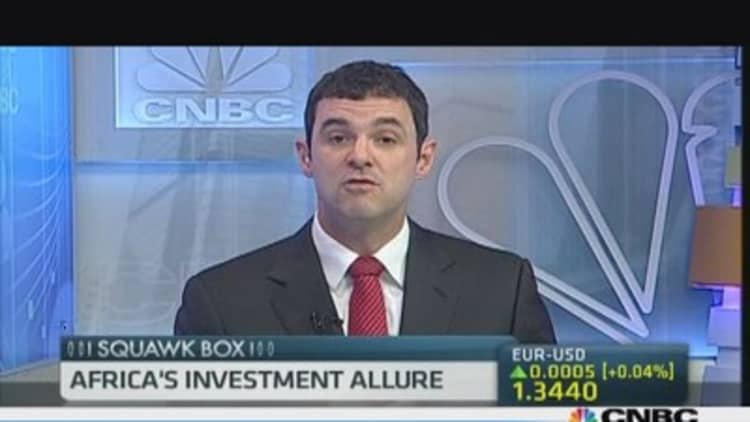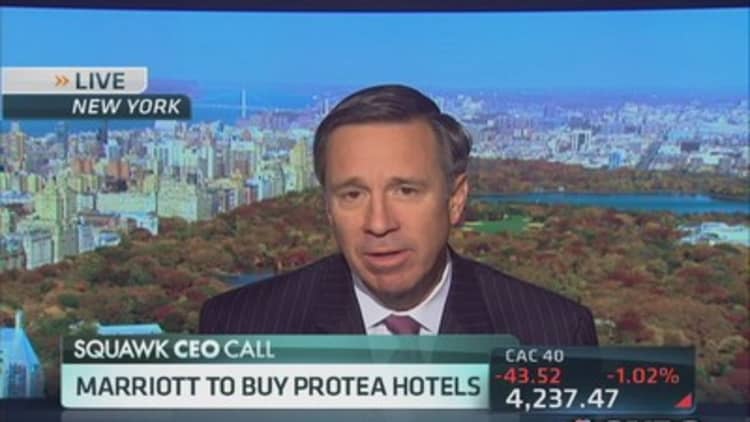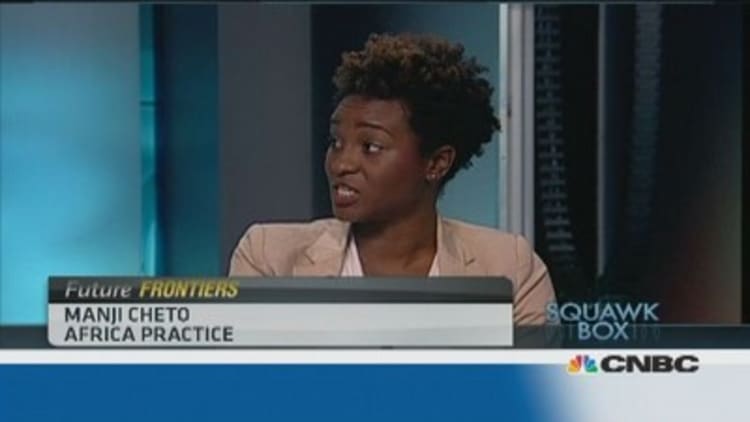Sub-Saharan Africa was once seen by U.S. investors as a pure commodity play—or as a part of the world to avoid entirely. No more. Smart money is increasingly finding its way into Africa, and it's getting big returns on (relatively) small investments.
David Rubenstein, co-founder of $180 billion Carlyle Group, was pushing Africa this month as the next big thing when another private equity titan, TPG Capital's David Bonderman, jumped in.
"It's one thing if you've got a few dollars to invest, it is very nice," Bonderman said at the DealBook conference in New York on Nov. 12. "But if you are running a Carlyle and you are trying to invest $500 million a crack, it is not so easy in a place like southern Africa."
Bonderman, who co-founded $55.7 billion TPG, hit on an obvious but important point: Investors increasingly hungry to put money to work in Africa will find few deals that rival growth plays and buyouts in developed markets, which can easily exceed $1 billion.
They can, however, put those "few dollars" to good use.
Big profits from small deals are no secret to Africa-focused private equity firms already well-established in the region. They usually invest $100 million or less—often less than $10 million—into companies that range from cellphones to yogurt to banking. About 52 percent of African private equity investments this year were less than $10 million, and 76 percent were less than $50 million, according to data from the African Private Equity & Venture Capital Association (AVCA).
But smaller investments can mean big profits. Investments on the continent produced annualized returns of 11.2 percent for the 10-year period ending Sept. 30, 2012, according to a study by AVCA and Cambridge Associates. That return was better than U.S. venture capital investments and roughly in line with emerging markets private equity and venture capital indexes over the same period.
To be sure, investing in Africa is no slam dunk. Whole swaths of the continent are ravaged by civil unrest or outright warfare, and Africa is broadly afflicted by political corruption, weak infrastructure and unreliable court systems.
Big returns

Still, American investors are increasingly seeing the value in small and middle market deals out of the continent.
"They are definitely more interested," said Richard Okello, a former partner at Bridgewater Associates who recently co-founded Africa-focused Sango Capital Management. Okello said he gets so many calls from people who want to learn about investing in Africa that he can't return them all.
"There are a lot of assets that are still well-priced and give you a good cushion," Okello added, describing various plays on the continent's emerging middle class. "They are fast-growing companies doing simple things that you don't have to be a rocket scientist to understand why that supply-demand gap exists."
Sango, which combines direct investing and allocations to third-party managers, launched last year and has already raised $110 million. It's now closed to new investment. The firm is based in Johannesburg, South Africa, but about 75 percent of its clients are private American institutional investors.
Firms are already taking advantage of the increased capital flows to Africa by selling their companies at high profits.
(Read more: Morgan Stanley, Abraaj among those seeing big Africa returns)
There were 118 "exits" from African companies—essentially, investors cashing out—by private equity firms from 2007 to 2012, according to a study by Ernst & Young and AVCA. The report found that African exits were nearly double the return of the public markets, as represented by an index of the Johannesburg Stock Exchange. The JSE is up about 138 percent over the last five years.
One example is West African-focused private equity firm African Capital Alliance's investment in Nigerian luxury busing. The firm made a $2.5 million investment into ABC Transport in 2003, when the company was one of the first to provide relatively high-end regional ground transportation. The company quickly became the Peter Pan or BoltBus of Nigeria, a welcome alternative to the crowded and unreliable travel options that existed. ABC went public on the Nigerian stock exchange in 2008, generating a 49 percent investor rate of return—or about five times their money.
ABC wasn't the only hit for African Capital. The Lagos, Nigeria-based firm produced a return of 46 percent in its first PE fund, which ran from 1998 to 2012. ACA has raised about $750 million overall and plans to start marketing a new fund in 2014. About 14 percent of their investors are American, and interest is increasing.
"We think it's just the beginning, because the returns will continue to tell the story," ACA partner Afolabi Oladele said by telephone from Lagos.
Another example is from Emerging Capital Partners, a $2 billion, Africa-focused PE shop. The firm profited from an early investment in African telecom just as mobile phone use started to explode on the continent. The firm put $50 million into telecom firm Celtel in 2000, and the company grew to become the largest mobile network in Africa. It was sold to Kuwaiti telecom company MTC for about $214 million, earning ECP a 4.3 times capital return.
Washington-based ECP has made about 50 investments across 40 countries in Africa since 2000 and averages about 2.4 times returns on their exits. The firm now sees opportunity in the casual dining market, such as ECP's investment in Nairobi Java House.
(Read more: )
"The greater upside comes from finding the smaller-scale companies with more potential for growth and scale—and therefore return," said Hurley Doddy, co-CEO of of $2 billion ECP.
That opportunity has money flowing in.
Sub-Saharan Africa is for the first time the most attractive emerging market for investors, according to a recent survey by the Emerging Markets Private Equity Association. Capital committed to the Africa-focused funds increased 20 percent to $779 million through the first three quarters of 2013, from $648 million for the same period in last year, according to the group.
Examples of recent deals include Jacana Partners' Nov. 11 investment in Process and Plant Sales Ghana, a supplier of industrial products and services to the mining, construction and processing industries in that country. Jacana wouldn't discuss the exact amount, but the firm typically invests $1 million to $5 million and has committed $28 million to date in 23 portfolio companies.
Other sample investments this year include Investec Asset Management's $33 million into South Africa insurance company Assupol Life; Amethis Finance's $11 million into Kenya's Chase Bank; and Advanced Finance and Investment Group's $7 million into Senegal's Elton Oil, according to AVCA.
New funds springing up

More and more big firms are getting involved.
Blackstone Group and KKR have made recent investments in Africa, and the Carlyle Sub-Saharan Africa fund, the first regionally focused fund by a major American private equity firm, will have $700 million by the end of 2013, exceeding its initial $500 million fundraising target at launch in 2012, according to a recent report.
The Abraaj Group, a $7.5 billion specialist in emerging and frontier markets, recently launched an $800 million Africa-focused fund, its third such vehicle. Abraaj typically targets three times growth in its portfolio companies from an initial investment of $20 million to $100 million and has achieved 25 exits in Sub-Saharan Africa in the last five years, according to partner Tom Speechley.
(Watch this: Africa is no longer a 'commodity story')
"What we've found in Africa, like many of our markets, is that in the mid-market you can find these companies and not end up competing with lots of other investors to do the deal. And so having identified an attractive sector, usually consumer-facing, you can have a choice of which company to back," Speechley said.
PineBridge Investments is also launching an Africa-focused fund of private equity funds and is seeking to raise $200 million. The firm—formerly the asset management businesses of American International Group—was one of the first international private equity participants in Africa when it began making investments in 2000.
'Really impressive management teams'

Investment bankers couldn't be more excited to advise on all the deals.
Allison Molkenthin, a managing director at Africa-focused boutique Bentley Securities, said American investors will be surprised by the management of potential portfolio companies.
"There are great small companies with really impressive management teams that know how to navigate developing and frontier markets, as they have grown up and innovated in them their whole lives," Molkenthin said.
Bonwick Capital is another. The firm is advising on five small African deals now and believes the returns will impress.
"It's much smaller than a typical private equity deal," said Chris Valentine, Bonwick's head of investment banking. "But the anticipated returns are in the 40 or 50 percent ... range in a very conservative base case."
—By CNBC's Lawrence Delevingne. Follow him on Twitter @ldelevingne.


